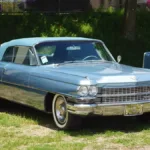Actually, the first word that probably comes to mind when thinking of washing a car is soap, brushes, and elbow grease. Sure. Ever think of the water you’re using? Well, believe it or not, the quality of your water may make all the difference in washing your car. From those impossible-to-get water spots to unseen damage, even the slight mistake from the wrong kind of water can cause problems for your car’s paint and finish.
This article which explores different types of water is what you will use to dive very deep on why water quality matters in car cleaning, and that will help you make the right choice for a streak-free gleaming finish. You might be an everyday car owner or a detailing enthusiast, but understanding how water affects your car is going to save you time, effort, and money in the long run.
Importance of Using the Right Water for Car Cleaning
You think maybe the water’s just the water, not all water alike-expecially for washing cars. Using the wrong kind of water can result in streaks, spots, even long-term damage to your vehicle’s paint job. Certain types of water have minerals or chemicals that bond with your car’s surface, which eventually creates unsightly blemishes and corrosion.
Whether you spray or detail, the right water might make the difference between sparkle shine and frustration over water spots. Here’s a rundown on the different types of water and what they mean for your car:.
Types of Water Used for Car Cleaning
Hard Water
Because of the type of minerals it comprises, such as calcium and magnesium, hard water dries up with significant residues. The minerals can attach themselves onto the surface of your car so spots and marks cannot easily be removed. If you stay in an area with hard water, you might already have noticed that everything gets affected by it, including the shower, your plates, and your car.
Soft Water
Of course, soft water contains fewer minerals. It’s much easier on your car’s paint job, too, because it doesn’t leave the same mineral deposits as hard water does, meaning fewer spots and easier rinsing and less chance to damage your paint job.
Deionized Water
Ultimately used and stripped of minerals and impurities, DI water is totally free of minerals, allowing an absolutely streak-free shine. Deionized water will evaporate, leaving behind nothing – no streaks, no spots, just a clean, shiny surface. This characteristic alone makes it highly popular among the professional detailers who require flawless finishes.
Distilled Water
Another option, of course, is distilled water, which contains no impurities. Not used very much for a full car wash, it does exceptionally well for spot cleaning, especially on windows and mirrors, those areas where streaking tends to happen a lot. As there are no minerals present, there is nothing to deposit after drying.
Effects of Using Hard Water on Car Surfaces

Water Spots and Mineral Deposits
Ever finish washing your car only to find that when it dries it is covered in water spots? Those are the results of hard water. The minerals in hard water don’t just evaporate with the water they stick around and leave visible spots. Left untreated, these spots can etch into your car’s paint, making them much harder to remove.
Long-Term Damage to Paint
Unless treated, the minerals in hard water can also be damaging for the long haul. Over time, they corrode your car’s clear coat. Then, the elements can shine through the paint underneath and repeat the aging process all over again. Fading, peeling, and rustset in. These three conditions are unsightly and also expensive to repair.
Why Soft Water Is Ideal for Car Cleaning
Preventing Water Spots
Soft water that contains fewer mineral deposits mostly limits the occurrence of water spots. Such a perfect shiny finish after washing a car can easily be achieved, as there is little mineral deposit. Since there are fewer minerals in soft water, it does not deposit as much mineral onto surfaces as its counterpart hard water does. It is softer water that has found favor in washing cars.
Gentle on Paint and Coatings
Using soft water is gentler on your car’s paint and any protective coatings you may have applied. Over time, it helps maintain the integrity of the paint job, reducing the need for costly repairs or reapplication of protective layers.
The Role of Deionized Water in Car Detailing
Spot-Free Rinse
Deionized water is the detailing magic trick used by professionals to ensure a spot-free finish. Since it is completely purified of any minerals, it gives that truly clean, spot-free rinse. When DI water dries, nothing is left behind-not even mineral spots-to make it perfect for professional-level washing.
Best for Professional Detailers
If you’re serious about detailing or work in a professional capacity, investing in a deionized water system can be a game changer. It ensures that you’ll never have to worry about water spots again, giving your clients (or yourself!) a flawless, showroom-ready result every time.
Distilled Water: When and Why to Use It
Perfect for Sensitive Areas
Distilled water is particularly useful for cleaning sensitive areas of your car, like windows and mirrors, where streaks and spots can be more noticeable. Its purity ensures that it leaves behind no residue, making it an excellent choice for touch-up jobs or final rinses.
Minimizing Streaks and Residue
For those who are meticulous about their car’s finish, distilled water can help eliminate any streaks or residue, ensuring a pristine look. While it’s not typically used for the entire wash, it’s a great tool to have in your arsenal for the final touch.
How to Test Your Water Quality for Car Washing

Not sure what kind of water you’re working with? You can easily test the hardness of your water with a home water testing kit. These kits are inexpensive and widely available. Knowing your water quality can help you decide whether you need to invest in a water softener or filtration system to get the best results from your car wash.
Tips to Make Any Water Suitable for Car Cleaning
Water Filtration Systems
If your local water is hard, installing a filtration system can help reduce the mineral content, making it much more suitable for car cleaning. These systems work by removing calcium and magnesium, helping to prevent water spots and protect your car’s paint.
Water Conditioners
Another option is using a water conditioner or additive. These products can be mixed with your water to neutralize minerals and prevent them from bonding to your car’s surface.
Common Myths About Car Cleaning Water
There are plenty of misconceptions about car washing, especially when it comes to water. One common myth is that all water is the same for cleaning this couldn’t be further from the truth. Another misconception is that hard water is harmless as long as you dry your car quickly. While drying helps, it doesn’t entirely prevent mineral deposits.
Cost-Effective Alternatives to Specialized Water
If you cannot get soft or deionized water, there are a number of relatively inexpensive alternatives. You can install a water filtration system in your home, or you can use water-softening products that make regular tap water safer for washing cars. Finally, most commercial car washes use deionized water for spot-free rinses at a very affordable price.
Environmental Impact of Water Usage in Car Cleaning
Water conservation is crucial, especially when it comes to washing your car. Using too much water not only wastes this precious resource but can also contribute to environmental runoff, which carries soap and contaminants into local water supplies. To minimize your environmental impact, consider using a water-efficient car wash system or wash your car at a commercial facility that recycles water.
Conclusion
Selecting the right type of water for washing your car is lots that may seem little, but it actually runs deep on the quality of car washing. From avoiding water spots to providing protection for your paintwork, using the best water, whether soft, deionized or distilled, may help you attain an almost flawless finish every time. Do not make water something you should not even think of, but rather make them one of your next essential components in your car care routine.
FAQs
- What’s the best water to use for car cleaning?
The best water for car cleaning is deionized water, as it leaves no spots or residue when it evaporates. - Can I wash my car with hard water?
Yes, but it’s not ideal. Hard water can leave behind mineral deposits that cause water spots and long-term damage to your car’s paint. - What is the benefit of using distilled water for car cleaning?
Distilled water is free from impurities, making it excellent for sensitive areas like windows and mirrors, preventing streaks and spots. - How can I test if my water is too hard for car washing?
You can purchase a home water testing kit to measure the hardness of your water. - Are there eco-friendly ways to wash my car?
Yes! Consider using a water-efficient car wash system, water recycling systems, or washing your car at a facility that recycles its water.
Also Read: Everything You Need to Know About Auxiliary Petrol Tanks







